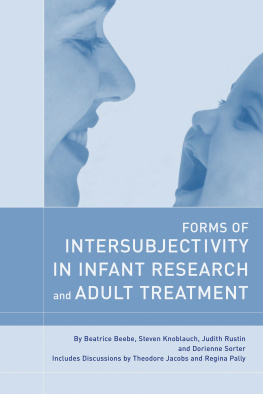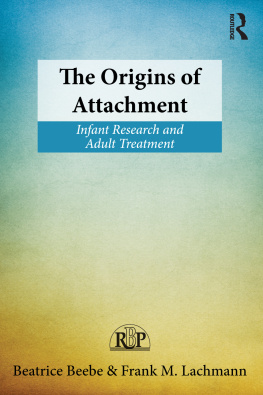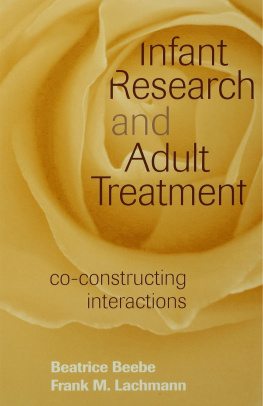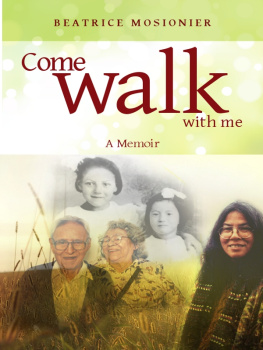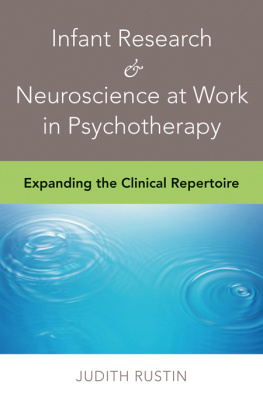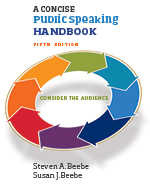Beatrice Beebe - Forms of Intersubjectivity in infant research
Here you can read online Beatrice Beebe - Forms of Intersubjectivity in infant research full text of the book (entire story) in english for free. Download pdf and epub, get meaning, cover and reviews about this ebook. year: 2020, publisher: Other Press, genre: Home and family. Description of the work, (preface) as well as reviews are available. Best literature library LitArk.com created for fans of good reading and offers a wide selection of genres:
Romance novel
Science fiction
Adventure
Detective
Science
History
Home and family
Prose
Art
Politics
Computer
Non-fiction
Religion
Business
Children
Humor
Choose a favorite category and find really read worthwhile books. Enjoy immersion in the world of imagination, feel the emotions of the characters or learn something new for yourself, make an fascinating discovery.
- Book:Forms of Intersubjectivity in infant research
- Author:
- Publisher:Other Press
- Genre:
- Year:2020
- Rating:3 / 5
- Favourites:Add to favourites
- Your mark:
- 60
- 1
- 2
- 3
- 4
- 5
Forms of Intersubjectivity in infant research: summary, description and annotation
We offer to read an annotation, description, summary or preface (depends on what the author of the book "Forms of Intersubjectivity in infant research" wrote himself). If you haven't found the necessary information about the book — write in the comments, we will try to find it.
Forms of Intersubjectivity in infant research — read online for free the complete book (whole text) full work
Below is the text of the book, divided by pages. System saving the place of the last page read, allows you to conveniently read the book "Forms of Intersubjectivity in infant research" online for free, without having to search again every time where you left off. Put a bookmark, and you can go to the page where you finished reading at any time.
Font size:
Interval:
Bookmark:
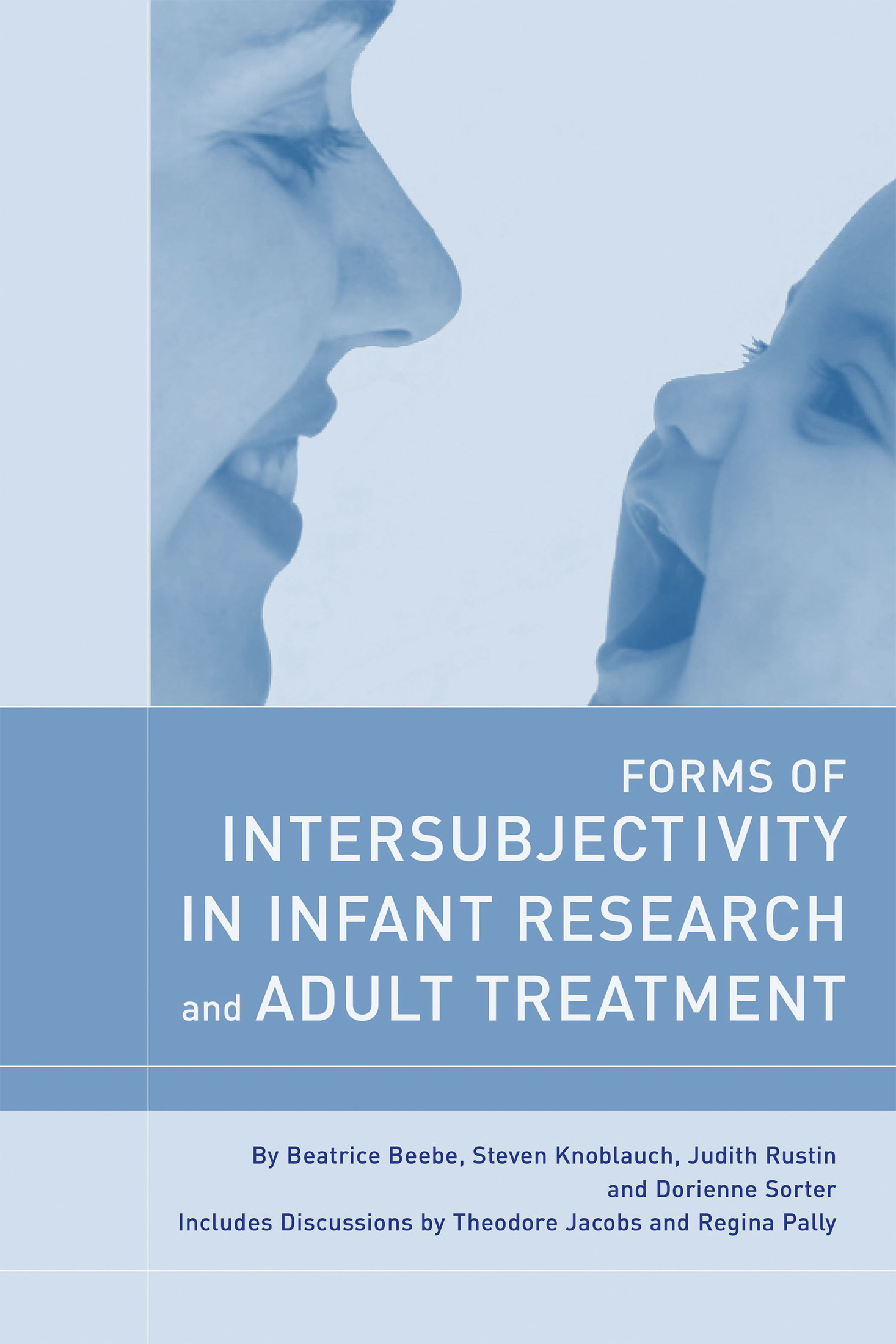
Additional Praise for
Forms of Intersubjectivity in Infant Research and Adult Treatment
Forms of Intersubjectivity in Infant Research and Adult Treatment is an outstanding achievement. Not only does it bring clarity to the confusing array of meanings attaching to the term intersubjectivity in the discourse of contemporary psychoanalysis and infant research. This alone would be a singular contribution, but the book does so much more. In forging important links among the fields of psychoanalytic theory, developmental research, and therapeutic practice, it offers a comprehensive and integrated view of human interaction that will be invaluable to clinicians and academics alike.
Robert D. Stolorow, Ph.D., coauthor, Worlds of Experience
The authors have provided a thorough, clarifying, and immensely useful discussion of the research and conceptual attempts to model the forms of intersubjective processes occurring between infants and caregivers, enlarging and deepening the issues. The usefulness of these ideas for clinicians, namely the importance of attending to implicit as well as to explicit processing, is brilliantly demonstrated through a remarkable ten-year treatment of an adult woman presented by Beebe. This is an important bookbreaking new ground in research methods, in theory building, and in therapeutic techniques!
E. Virginia Demos, Assistant Clinical Professor of Psychology in the Department of Psychiatry at Harvard Medical School
I would recommend this volume on intersubjectivity to psychotherapists of all schools. Not only will it allow them to upgrade their theories about psychotherapist/patient interaction, it uses clear concepts and language to provide them with an extensive review of the literature on clinical and experimental studies of how psychoanalytic psychotherapies operate, and how patients can be helped. Clinical vignettes demonstrate how verbal and bodily, cognitive and emotional dimensions are combined to form a particularly clear vision of what is being experienced and enacted at each moment. One of the originalities of this model is the imaginative way in which a relation is perceived as a combination of interactive and auto-regulative strategies. Finally, this volume contains original and imaginative theoretical and practical suggestions about effectively combining scholarship and love in order to help wounded souls.
Michael Coster Heller, Ph.D., editor of The Flesh of the Soul
Moving their video camera from the studies of caretaker-infant interactions to the broad field of intersubjectivity, Beebe, Knoblauch, Rustin, and Sorter utilize dyadic systems theory as a panorama that integrates verbal and nonverbal, implicit and explicit dimensions of interactions. In a clear, eminently readable and concise manner, comparisons of five theories of intersubjectivity in adult treatment (Benjamin, Ehrenberg, Jacobs, Ogden, Stolorow) are explicated and enhanced with diagrams that emphasize similarities and differences among theorists. Close-ups of the work of three theorists of intersubjectivity (Meltzoff, Stern, Trevarthen) in infant research address their similarities and differences, focusing on the concepts of matching, the role of self-regulation, and the balance between self- and interactive regulation. The final section consists of a microanalytic description of Beebes treatment of a fragile, traumatized woman. Beebe videotaped her own face during portions of this treatment so that the patient, unable to look at her at times during sessions, and later unable to see her in continued telephone sessions, could process her experience of the sessions under less pressure. The detailed discussions of this treatment makes not only for compelling reading but provides a model for a creative, yet rigorously disciplined treatment approach. The relevance of attending to nonverbal communication and forms of intersubjectivity from infant research are carefully documented in this adult treatment case. Discussions by Theodore Jacobs and Regina Pally provide additional perspectives on this exciting and rich material.
Frank M. Lachmann, Ph.D., author of Transforming Aggression: Psychotherapy with the Difficult-to-Treat Patient
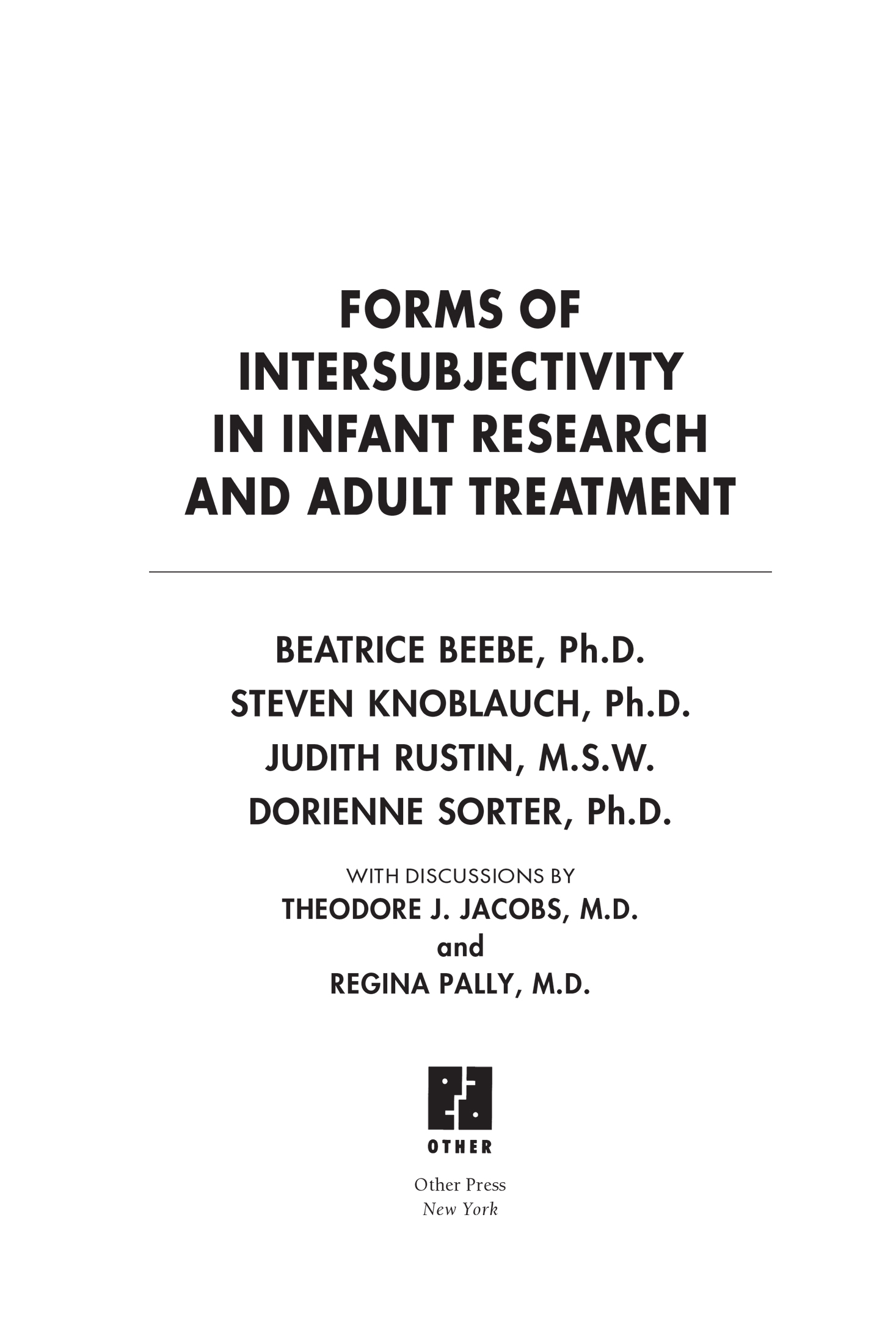
Permission to reprint chapters from Psychoanalytic Dialogues Part 1: 13 (6): 743841, 2003; Part II: 14 (1): 151, 2004 is gratefully acknowledged. Reprinted by permission of the Analytic Press, Hillsdale, NJ.
Copyright 2005 Beatrice Beebe, Steven Knoblauch, Judith Rustin, Dorienne Sorter, Theodore J. Jacobs, and Regina Pally
Production Editor: Mira S. Park
Ebook ISBN9781635421156
All rights reserved. No part of this publication may be reproduced or transmitted in any form or by any means, electronic or mechanical, including photocopying, recording, or by any information storage and retrieval system, without written permission from Other Press LLC, except in the case of brief quotations in reviews for inclusion in a magazine, newspaper, or broadcast. For information write to Other Press LLC, 267 Fifth Avenue, 6th Floor, New York, NY 10016. Or visit our Web site: www.otherpress.com.
The Library of Congress has cataloged the printed edition as follows:
Forms of intersubjectivity in infant research and adult treatment / Beatrice Beebe[et al.].
p. cm.
Includes bibliographical references and index.
ISBN 978-1-59051-151-0 (pbk. : alk. paper) 1. Psychotherapist and patient. 2. Intersubjectivity. 3. Psychotherapy. I. Beebe, Beatrice,
1946
RC480.8.F67 2005
616.8914dc22
2005012813
a_prh_5.6.0_c0_r0
Dedication
To Ruth and Gilbert Beebe
Edward McCrorie
and
Dolores
To Ingrid Roze and Giana Knoblauch
To Herb and Cara Rabin
To George Sorter
Beatrice Beebe, Steven Knoblauch, Judith Rustin, Dorienne Sorter
Beatrice Beebe, Dorienne Sorter, Judith Rustin, Steven Knoblauch
Beatrice Beebe, Judith Rustin, Dorienne Sorter, Steven Knoblauch
Beatrice Beebe
Theodore J. Jacobs
Regina Pally
We would like to thank the psychoanalytic communities who have encouraged our study of the relevance of infant research for psychoanalysis. For all of us, we express a deep gratitude to the Institute for the Psychoanalytic Study of Subjectivity, out of which our association grew. We all thank our students and supervisees. In addition, Beatrice Beebe and Steven Knoblauch thank the New York University Postdoctoral Program in Psychotherapy and Psychoanalysis. Beatrice Beebe thanks the Columbia Psychoanalytic Center. Judith Rustin, Steven Knoblauch, and Dorienne Sorter thank the Psychoanalytic Psychotherapy Study Center. Steven Knoblauch thanks the Institute for Contemporary Psychotherapy and the National Institute for the Psychotherapies.
We are grateful to the editors of Psychoanalytic Dialogues, who first published the four core chapters of this book (entitled Symposium on Intersubjectivity in Infant Research and Its Implications for Adult Treatment. Part I: Psychoanalytic Dialogues (2003) 13(6):743841; Part II: Psychoanalytic Dialogues (2004) 14(1):151). Particular thanks to Carolyn Clement, who invited the work and encouraged Beatrice Beebe to add the case of Dolores, as well as to Neil Altman and Lew Aron. We are particularly indebted to these editors for their suggestion that we add a clinical case, which became the fourth chapter of this book. We wish to thank the staff at Analytic Press, and particularly Eleanor Starke Kobrin and Meri Freedman, for their editorial support in producing the original four papers for the journal. We thank Paul Stepansky for permission to republish the work in book form.
Font size:
Interval:
Bookmark:
Similar books «Forms of Intersubjectivity in infant research»
Look at similar books to Forms of Intersubjectivity in infant research. We have selected literature similar in name and meaning in the hope of providing readers with more options to find new, interesting, not yet read works.
Discussion, reviews of the book Forms of Intersubjectivity in infant research and just readers' own opinions. Leave your comments, write what you think about the work, its meaning or the main characters. Specify what exactly you liked and what you didn't like, and why you think so.

